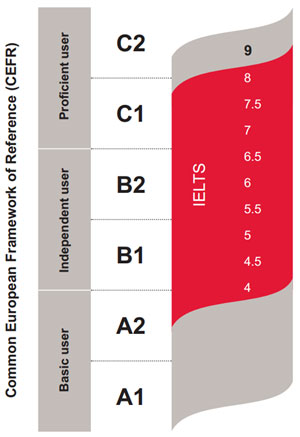Coherence and Cohesion (In Detail): Task 2
Coherence and Cohesion is probably the band score that you know the least about.
However, considering it’s worth 25% of your IELTS Writing score, you absolutely must understand the requirements before your IELTS test.
In this lesson, you’ll learn how to get a high Coherence and Cohesion score by seeing how IELTS examiners mark your writing, discovering the most common mistakes and seeing examples of Task 2 writing from bands 5 to 9.

Here are the specific topics we’ll cover:
- What is Coherence and Cohesion?
- Coherence: Achieving a High Score
- Pronouns: Common Cohesion Mistakes
- Pronouns: Improving Range & Accuracy
- Cohesive Devices: Common Cohesion Mistakes
- Cohesive Devices: Improving Range and Accuracy
- Paragraphs: Common Cohesion Mistakes
- Paragraphs: Logical Organisation
- Examples of Coherence and Cohesion: Band 5 to Band 9
Prefer to watch the video version?
What is Coherence and Cohesion?
How easily can someone read your writing?
The answer to that question is what Coherence and Cohesion focuses on.
Coherent writing is easy to understand because the vocabulary and grammar are accurate.
Cohesive writing is easy to follow because pronouns, cohesive devices and paragraphs are used properly.

In the context of IELTS Writing Task 2, Coherence and Cohesion is one of the four bands used to assess your Task 2 essay.
The other bands are Task Achievement, Lexical Resources and Grammatical Range & Accuracy.
IELTS has published a document to outline the requirements for each band score in Coherence and Cohesion which you can see here.
However, the document contains a lot of academic vocabulary so it’s a bit difficult to understand.
That’s why we will go through everything in detail here.
Coherence: Achieving a High Score
To make sure your writing is coherent, the vocabulary and grammar in your answers need to be accurate.
Let’s look at the most common reasons why candidates don’t get a high score and how to overcome them.
Vocabulary Issue #1 – Unfamiliar Topics
Everyone has topics that they’re very familiar with and topics they are unfamiliar with.
For example, a doctor or a nurse will easily write a coherent essay when the Task 2 question is about health issues but when they write an essay about a less familiar topic, the essay will be less coherent.

To make sure you can write a completely coherent essay in your IELTS Writing test, make sure that you can discuss all the common Task-2 topics such as;
- health
- social issues
- environmental issues
- shopping
- parenthood
- the media
- technology
- housing
- transportation
- education
- jobs & careers
- accommodation
- lifestyle
Vocabulary Issue #2 – Pushing Yourself Too Far
In the IELTS test, many candidates use vocabulary that they think will impress the examiner.
This results in incoherent writing because these candidates end up using words that they don’t fully understand.
The solution is not to push yourself into using vocabulary you can’t use.
Only include words that you can use with confidence and that you know will clearly communicate your ideas to the examiner.

Grammar Issue #1 – Small Grammar Mistakes
There are times when a small grammar mistake can confuse the reader.
Example #1
I had my IELTS test tomorrow.
In this sentence, we see past tense (had) being used with ‘tomorrow’.
Therefore, we must guess whether the writer is trying to say ‘I had my IELTS test yesterday.’ or ‘I have my IELTS test tomorrow.’
If the reader is confused or has to guess the meaning like this, that means the writing isn’t coherent.
Example #2
I need to change the date of my IELTS test so I will call an IELTS test centre.
If this person had written “the IELTS test centre,” I would understand that they are calling the specific test centre where they had booked their test.
Because they said “an IELTS test centre,” it’s not clear which centre they intend to phone.

Again, this small grammar mistake has caused confusion for the reader, so the sentence is not coherent.
What’s the solution?
To find out what small grammar mistakes you make, ask an English-speaking friend to read some of your writing and circle all the mistakes.
Next, make a list of the type of mistakes with the number of times you made each one. Here’s an example of what your list should look like;
- articles x 5
- pronouns x 7
- tense x 3
Don’t try to fix all of them at the same time. Doing too much at once will result in slow progress.
Instead, just choose the most common mistake and focus on improving that. In the above example, this would be pronouns.
Grammar Issue #2 – Very Long Sentences
This issue comes from a misunderstanding of the band descriptors.
The band descriptors mention ‘complex structures’ and ‘complex sentence forms’.
Many candidates incorrectly interpret these phrases to mean that sentences should be long and complicated.
What these terms actually mean is that sentences should have more than one clause.
They do not mean that sentences should be difficult to read.

To overcome this, make sure that all your sentences include two or three clauses and don’t push yourself beyond that.
The Most Serious Coherence Issue – Low English Level
This is an issue that IELTS students find difficult to accept.
It’s natural to want an easy solution to our problems, but a student who ignores this issue will never achieve their desired IELTS score.
If this is the situation you’re in, you should focus on improving your English first and continue learning about the IELTS test after you’ve improved your English level.
If you’re unsure what English level is required for your IELTS score, this useful image from IELTS.org will help you understand.

Pronouns: Common Cohesion Mistakes
The use of pronouns, also known as referencing, is a key factor in the cohesion of a text.
Pronouns are words such as ‘she’, ‘her’ and ‘hers’, and in English, we use pronouns wherever possible.
To achieve a high Coherence and Cohesion band score, it’s essential that you can use pronouns effectively.
The three following examples show the most common mistakes that IELTS candidates make with pronouns.
1st Common Pronoun Mistake
I was eating an apple, and the apple fell on the floor.
Why this affects Coherence & Cohesion
There is an opportunity to use a pronoun, so this opportunity needs to be taken.
Correction
I was eating an apple, and it fell on the floor.

2nd Common Pronoun Mistake
I was buying some apples, and it fell on the floor.
Why this affects Coherence & Cohesion
A plural pronoun must refer to a plural noun. An incorrect pronoun means the reader must guess what’s happening.
Correction
- I was buying some apples, and they fell on the floor.
- I was buying some apples, and one of them fell on the floor.
3rd Common Pronoun Mistake
When my wife and daughter got home, she gave me an apple.
Why this affects Coherence & Cohesion
It’s not clear which noun the pronoun is referring to. It could be my wife or my daughter. In this case, using a pronoun isn’t possible.
Correction
When my wife and daughter got home, my wife gave me an apple.
When my wife and daughter got home, my daughter gave me an apple.
Pronouns: Improving Range & Accuracy
To improve your ability to use pronouns accurately, you need to decide where to start.
Choose the goal you need to achieve from the list below and start from there;

Learn the Basics of Pronouns
You’re in luck because there are a lot of great resources online to help you with this.
However, make sure only to use reliable websites. If the materials aren’t accurate, this will cause confusion, waste your time and potentially reduce your Coherence and Cohesion score.
Here are pronoun resources from some of my favourite websites;
How can you use these resources effectively?
At your level of English, it’s incredibly unlikely that you will find a grammar rule that you haven’t seen before. But that’s not what you’re looking for.
You shouldn’t search for information you haven’t seen before.
You should search for the information you don’t fully understand and give your attention to that.

If you can do that, you’re guaranteed to improve and then you’ll be ready to move on to the next step.
Master Accurate Use of Pronouns
The key to mastering this is through reading.
Firstly, make sure to read texts that are suitable for your English level. You should aim for texts where you understand about eighty or ninety per cent.
If you understand everything in the text, you’re not going to learn anything new.
If you understand very little in the text, you’re going to get lost.

Once you have a suitable text, take your time and analyse each pronoun that you find. Ask yourself why that pronoun was used and what grammar rule is dictating the usage.
If you can answer those questions, continue reading. If you cannot answer those questions, research the answer.
The more you do this, the quicker you’ll identify why each pronoun is used. This will naturally lead to improved accuracy in your own writing and speaking.
Reading in this way is referred to as ‘active reading’. To learn more about active reading, click here for a useful article from The Open University.
Fixing Pronoun Slips
A slip is a mistake you make while writing but when you read it, you know it’s wrong.
It’s completely normal to make slips in writing, and this happens to absolutely everyone.
You shouldn’t worry about these mistakes until you’ve finished writing your Task 2 essay.
As you have 40 minutes to write your Task 2 answers, you should aim to use the last 5 minutes for correcting slips in your writing.
During these 5 minutes, don’t just read the text and hope that you notice a mistake. You need to carefully search for the slips you regularly make and focus on correcting as many of those as possible.

If pronoun slips are common for you, make sure to search for and correct these.
Cohesive Devices: Common Cohesion Mistakes
Cohesive devices help the reader follow your writing by indicating or clarifying the connection between ideas and sentences.
These are words and phrases like ‘for example, ‘however’, ‘too’, ‘but’, and ‘subsequently’.
To help the reader to follow our writing with ease, we must use cohesive devices to guide the reader through the text.
To see how important cohesive devices are, look at the two texts below.
They both communicate the same information.
The second text, however, is much easier to follow as the writer has used pronouns and cohesive devices to guide the reader.

Text 1
Parents should encourage their children to eat fruit from a young age. The children will have a healthier diet when they grow up. For most adults, what was eaten as a child becomes their normal diet. Unless this includes fruit, it’s unlikely for someone to adopt this healthy habit later in life.
Text 2
Parents should encourage their children to eat fruit from a young age as this will result in the children having a healthier diet when they grow up. This is because, for most adults, what was eaten as a child becomes their normal diet, and unless this includes fruit, it’s unlikely for someone to adopt this healthy habit later in life.
Common Mistakes with Cohesive Devices
To make sure you can achieve a high score for Coherence and Cohesion, you’ll need to avoid the typical mistakes that IELTS candidates make with cohesive devices.
Let’s look at them here.
1st Common Mistake with Cohesive Devices
I always enjoy fresh fruit; moreover, when I eat a lot, I get a headache.
Why this affects Coherence & Cohesion
This candidate has used a cohesive device that they don’t understand.
The word ‘moreover’ indicates that another positive comment is coming.
Telling the reader to expect something positive and then mentioning a problem is confusing.

Correction
I always enjoy fresh fruit; however, when I eat a lot, I get a headache.
2nd Common Mistake with Cohesive Devices
I enjoy eating many types of fruit like tropical fruits like bananas and mangoes, and berries like strawberries and raspberries, and citrus fruits like oranges and grapefruits.
Why this affects Coherence & Cohesion
The issue here is the lack of range in the cohesive devices used.
Without enough variety, the band score for Coherence and Cohesion will not be high.

Correction
I enjoy eating many types of fruit, for example, tropical fruits such as bananas and mangoes, or berries, like, strawberries and raspberries. I also enjoy citrus fruits like oranges and grapefruits.
3rd Common Mistake with Cohesive Devices
Yesterday, I realised that I had some free time. Consequently, I decided to go to the shop to buy some fruit. Subsequently, I got my keys and drove there. However, the shop was closed already. What’s more, I got a flat tyre on the way home.
Why this affects Coherence & Cohesion
Using a cohesive device with every sentence does not improve cohesion.
Overusing cohesive devices like this will also have a negative effect on the Coherence and Cohesion score.

Correction
Yesterday, I realised that I had some free time, so I decided to go to the shop to buy some fruit. I got my keys and drove there, but the shop was closed already. What’s more, I got a flat tyre on the way home.
Cohesive Devices: Improving Range and Accuracy
To achieve a high score for Coherence and Cohesion, you need to;
- Increase your Range of Cohesive Devices
- Accurately Use Cohesive Devices
- Appropriately Use Cohesive Devices
Increase your Range of Cohesive Devices
For IELTS Writing Task 2, you don’t need to learn a lot of cohesive devices.
As long as you know two or three cohesive devices for the various functions like changing topic, adding information and showing contrast, that’s enough.
Of all the resources online, the list of cohesive devices I like best is in this document published by the British Council.

This list has enough range, covers all the necessary functions and all the cohesive devices included are appropriate for Task 2 essays.
If you know all of these, that will be enough to get you a high Task 2 score.
Accurately Use Cohesive Devices
To use a cohesive device accurately, you need to know exactly what it means and where it fits into a sentence grammatically.
Learning a cohesive device from a list means you can understand it, it does not mean that you can use it accurately.
How to ensure accuracy?

In the list from the British Council shared above, let’s take the cohesive device ‘owing to’ as an example.

You can see that ‘owing to’, ‘because of’ and ‘due to’ are all used to provide explanations.
However, we don’t know if they have the same meaning or are used in the same way grammatically.
Essential Research
We need to do some research before we can start using this in our Task 2 answers.
The first thing I’ll do is search for it in a dictionary.
The definition isn’t very useful as we already knew it has the same meaning as ‘because of’.

However, we can replace ‘owing to’ with ‘because of’ in the example sentence provided.
The concert has been cancelled owing to lack of interest. >>> The concert has been cancelled because of lack of interest.
Providing I can already use ‘because of’ with grammatical accuracy, this will tell me if these cohesive devices are used in the same way or not.
Next, I will search for ‘owing to’ in Google. I’m interested in finding examples of this cohesive device being used in the real world.
All the search results are showing me definitions from various dictionaries but this isn’t what I’m looking for.
Because I’m more interested in real-world examples, I will click on the ‘News’ tab in Google to find the results I need.

Looking at five to ten examples will help me get a very clear understanding of how and when to use this term.
Finally, I will add the cohesive devices to my notebook along with what I’ve learned about it and some useful examples.
Cohesive Devices in Context
To help you begin your research, you’ll find many of the cohesive devices in these two paragraphs.
In the IELTS Writing test, it’s essential to get a high score in Coherence and Cohesion in addition to the other three band scores. It is equally important because each band score is worth 25%. For this reason, if you get good scores in Task Achievement, Lexical Resource and Grammatical Range and Accuracy, for example, you could still get a low overall score because of poor Coherence and Cohesion in your essay. Although many students already know this, it seems to me that as a result of the fact that Coherence and Cohesion is more difficult to understand, IELTS students focus more on improving the other band scores. Consequently, they may not get the score they need in their IELTS test.
In contrast, you’re now aware of the importance of Coherence and Cohesion, which means you can firstly learn a range of cohesive devices, secondly, learn how to organise your paragraphs. Next, make sure that you use pronouns accurately and then work on any grammar mistakes you make, for instance, with articles or prepositions.
Appropriately Use Cohesive Devices
The most important thing is not to use cohesive devices in every sentence of your Task 2 essay.
Using too many cohesive devices will reduce your IELTS Writing score.
You must use some cohesive devices in your essay so that the reader can easily follow your writing, but just don’t use them in every sentence.

This is confirmed in the IDP website, where they refer to the excessive use of cohesive devices stopping a candidate from scoring band 8 in Coherence and Cohesion.
Another interesting piece of information on that page is about the placement of cohesive devices.

As you can see, we shouldn’t always place cohesive devices at the beginning of sentences.
What they mean by this is that placing the cohesive device within the sentence sometimes will benefit your Coherence and Cohesion score.
Here are some examples of how to do this
- For example, Coca-Cola has been employing… >>> Coca-Cola, for example, has been employing…
- However, this did not result in… >>> This, however, did not result in…
This does not mean that you should always place your cohesive devices inside the sentence.
Showing the examiner that you have mastered various structures will result in the highest possible score, so place some cohesive devices at the beginning of sentences and others inside.
Paragraphs: Common Cohesion Mistakes
Not writing in paragraphs or not logically organising paragraphs are the two most common issues.
It is essential to use paragraphs in your essay, or else you won’t get higher than a band 5 for Coherence and Cohesion.
Even when the rest of your writing is fantastic, if your essay doesn’t have paragraphs, you’re not going to get a good score.

Now that you’re clear on how important paragraphs are, you need to use them correctly.
Each paragraph needs to cover one main topic.
- The introduction paragraph should introduce what the essay is about.
- The body paragraphs should develop one main topic.
- The conclusion should summarise what the reader has learned.
This is actually quite straightforward but, to avoid any mistakes, it’s best to write a brief plan of what information you’ll include in each paragraph before you write your essay.
When IELTS candidates don’t write a plan first, their essay tends not to be logically organised and tends to contain irrelevant information.
The sample body paragraph below will help you understand how this happens so easily.
Body Paragraph
The main reason that I moved to the countryside is because I wanted to plant an orchard. My grandparents had one at their house when I was little, and since then, I have always wanted one of my own. The fresh air and the silence are also delightful compared to the city I lived in. For example, I was never able to open my windows when I lived in the city as the pollution was too bad and the noise was very distracting.
Paragraph Analysis for Coherence and Cohesion
To read the above paragraph, it all makes sense, and each sentence progresses logically from one to the next. Outside of the IELTS test, this paragraph is absolutely fine.
However, based on the IELTS marking criteria, a major error in this paragraph would reduce the Coherence and Cohesion score.

Sentence 1 Analysed
The first sentence of any IELTS body paragraph is known as the topic sentence as it states the paragraph’s topic.
The topic sentence above states that the paragraph is about moving to the countryside to plant an orchard. Hence, the examiner’s expectation is for the rest of the paragraph to discuss this topic and nothing else.
Sentence 2 Analysed
This sentence is appropriate as it refers to the main topic stated in the topic sentence.
Sentence 3 Analysed
This is where the problem starts as the writer is now discussing other benefits of living in the countryside. Remember, the paragraph is not about living in the countryside; it’s about moving to the countryside to plant an orchard. That means that it isn’t logical to discuss this topic here, and the Coherence and Cohesion score is affected.
Sentence 4 Analysed
Here we see the same issue as sentence 3, where the topic of the sentence is not related to the paragraph’s topic.
So those are the basics of what an examiner is looking for when deciding your Coherence and Cohesion score.
Paragraphs: Logical Organisation
For this, it’s easiest to use a structure designed specifically for the IELTS test.
This will ensure that each paragraph has a purpose and all the information is logically organised.
Combine this with writing a plan before writing your essay and you’ll significantly improve both your Coherence and Cohesion and Task Achievement scores.
The structures that I recommend for Task 2 can be seen in the images below, and my lesson dedicated to idea generation and essay structures will explain exactly how to use them.



Examples of Coherence and Cohesion: Band 5 to Band 9
For this part of the lesson, we will look at paragraphs that respond to this question;

Paragraph #1
For many decades, schoolchildren have enjoyed studying music at school. According to me, I think that there are other subjects that are more important for schoolchildren so I agree with some people who believe that studying music should be removed completely from schools because there are other more important subjects for students to spend their time on. Furthermore, I also agree with these people because schoolchildren can study music outside of school and studying music at school won’t help with their future career.
Analysis
Sentence 1:
This is a coherent sentence, but it’s not clear why I need to know this information, and it doesn’t help me understand what the essay is about.
Background statements like this won’t improve your IELTS score, so I would recommend not including vague information like this.
Sentence 2:
The phrase ‘according to me’ doesn’t exist in the English language, so it cannot be used as a cohesive device. We use the phrase ‘according to’ when we want to refer to something another person thinks when we don’t have the same opinion.
A pronoun should be used instead of ‘schoolchildren’ as it’s already clear what the writer is referring to.
Including a personal opinion before outlining what the essay is about isn’t logical. It’s best to describe the topic in the question first and then state how we feel about this.
Repetition of the idea that there are other more important subjects is unnecessary. Including this information once is enough.
Sentence 3:
The issue with this sentence can only be seen when we look at the essay as a whole.
The writer has stated two reasons. The first one mentioned is ‘schoolchildren can study music outside of school’ and the second one is ‘studying music at school won’t help with their future career’.
We expect the rest of the essay to discuss these ideas in the same order. However, this candidate has decided to discuss the second reason in the next paragraph and the first reason in the subsequent paragraph.
This is illogical and will affect the Coherence and Cohesion score negatively.
Coherence and Cohesion Score
Writing of this quality would get a band score of 5 for Coherence and Cohesion.
Sample of Band 9 for Coherence and Cohesion
There are some who believe that music lessons should be removed completely from school curriculums so as to focus students on more essential subjects. I completely agree with this statement because studying music rarely benefits a person’s future career opportunities, and musical instruments can still be learned after school hours.
Paragraph #2
On the one hand, it is incredibly unlikely that what a student learns in their music class will benefit the student in their career when he’s older. Furthermore, achieving good grades in subjects like science and technology will definitely benefit a student because these subjects have spawned massive industries which are still growing. For example, in Japan, there is far less unemployment for the students who have degrees in science and technology compared to students who have different qualifications.
Analysis
Sentence 1:
The cohesive device ‘on the one hand’ is not suitable here. It is used to indicate that this paragraph and the next paragraph will show conflicting ideas or two sides of a situation. This essay outlines two reasons for agreeing which means that this choice of cohesive device is inaccurate and will reduce the Coherence and Cohesion score.
The wording of ‘what a student learns in their music class’ is cumbersome and will need to be rewritten to be more easily understood.
The pronoun ‘them’ should be used to replace the second instance of ‘the student’.
The pronoun ‘he’ isn’t accurate. We are referring to students in general, so the pronoun ‘they’ is appropriate.
Sentence 2:
This is the second sentence in a row that begins with a cohesive device, and we can see that the next sentence does the same thing. We cannot overuse cohesive devices in this way and should only use them when necessary.
The shift in topic is unexpected. We read about music in the previous sentence, and suddenly we’re reading about science and technology. It’s best to indicate to the reader that there is a change in focus coming or to explain why we are now talking about a new topic.
Sentence 3:
This is a very coherent and cohesive sentence.
We could improve it further by putting the cohesive device ‘for example, inside the sentence instead of at the beginning. Remember that it’s good to do this sometimes but shouldn’t be done in every instance.
Coherence and Cohesion Score
Writing of this quality would get a band score of 6 for Coherence and Cohesion.
Sample of Band 9 for Coherence and Cohesion
It is incredibly unlikely that a student will have the opportunity to gain employment based on what is learned from the content of their music lessons. To increase their prospects of finding a secure job, it would be much better for their time to be focused on achieving good grades for subjects like science and technology as these subjects have spawned massive industries which are still growing. In Japan, for example, students with degrees in science and technology experience less unemployment than those with other qualifications.
Paragraph #3
Furthermore, children can learn how to play a musical instrument outside of school if it’s something that they are interested in. In addition, when a child wants to learn how to play a musical instrument, they can buy a cheap second hand one and learn for free on the internet. This means that anyone who has a real passion for music will have no restrictions from mastering the instrument of their choice during their free time. For example, several members of my family learned to play the piano with the aid of YouTube piano tutorials and none of them studied music at school.
Analysis
Sentence 1:
This is a very well-constructed sentence.
Sentence 2:
This sentence is well-written as well. The only issue is the fact that the candidate is starting too many sentences with cohesive devices, so it would be better to remove ‘in addition’ as the sentence would be just as coherent and cohesive without it.
Sentence 3:
Another good sentence in terms of Coherence and Cohesion.
Sentence 4:
The cohesive device ‘for example’ was already used in the previous paragraph, so it would be better to have a different one here to improve the range.
Although it isn’t a major issue, the word ‘piano’ in the phrase ‘YouTube piano tutorials’ is redundant as the reader will already know what type of tutorials from the context.
Coherence and Cohesion Score
Writing of this quality would get a band score of 7 for Coherence and Cohesion.
Sample of Band 9 for Coherence and Cohesion
Furthermore, students who are interested in music can learn to play an instrument outside of school. Cheap second-hand instruments and free online lessons mean that any child who has a passion for playing music can master the instrument of their choice during their free time. Several members of my family, for instance, have learned to play the piano with the aid of YouTube tutorials without ever studying music at school.
Paragraph #4
In conclusion, I firmly believe that schools should remove music from their curriculum to let students focus on more important subjects and any student who is interested in learning how to play music can still learn outside of school hours.
Analysis
Sentence 1:
This an excellent sentence and contains everything that an IELTS examiner is looking for to reward a high score.
Coherence and Cohesion Score
Writing of this quality would get a band score of 8 for Coherence and Cohesion.
Sample of Band 9 for Coherence and Cohesion
In conclusion, I firmly believe that schools should remove music from their curriculum so that students can focus on more important subjects and, if they are interested, they can learn to play music outside of school hours.
What now?
You’ve just learned absolutely everything there is to know about Coherence and Cohesion.
I realise it’s a lot to take in and I’d like to congratulate you on making it all the way to the end of the lesson. 🙂
You’ve likely discovered some areas of weakness that you have. Make sure to make notes of what they are and address them before your IELTS test.

Make sure to study my lessons on Task Achievement, Lexical Resource and Grammatical Range and Accuracy if you haven’t already completed them.
